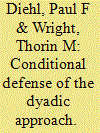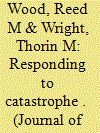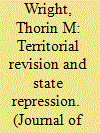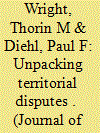|
|
|
Sort Order |
|
|
|
Items / Page
|
|
|
|
|
|
|
| Srl | Item |
| 1 |
ID:
146206


|
|
|
|
|
| Summary/Abstract |
We contend that the dyadic approach should be employed as a theoretically informed choice. All choices of units in modeling are simplifying. Current criticisms do not render dyadic approaches useless forms of simplification. Indeed, depending on the question and theory, dyadic approaches may be the most appropriate simplification of reality for scholars of international studies. The basic structure of the dyad, a two actor interaction, remains a useful simplification for multiple key questions in conflict research. As such, we offer a conditional defense of the dyadic approach in light of three elements: (i) the choice of level of analysis, (ii) the assumption of independence of cases, and (iii) the benefits accrued by past dyadic research.
|
|
|
|
|
|
|
|
|
|
|
|
|
|
|
|
| 2 |
ID:
149476


|
|
|
|
|
| Summary/Abstract |
Natural disasters often cause significant human suffering. They may also provide incentives for states to escalate repression against their citizens. We argue that state authorities escalate repression in the wake of natural disasters because the combination of increased grievances and declining state control produced by disasters creates windows of opportunity for dissident mobilization and challenges to state authority. We also investigate the impact of the post-disaster humanitarian aid on this relationship. Specifically, we argue that inflows of aid in the immediate aftermath of disasters are likely to dampen the impact of disasters on repression. However, we expect that this effect is greater when aid flows to more democratic states. We examine these interrelated hypotheses using cross-national data on immediate-onset natural disasters and state violations of physical integrity rights between 1977 and 2009 as well as newly collected foreign aid data disaggregated by sector. The results provide support for both our general argument and the corollary hypotheses.
|
|
|
|
|
|
|
|
|
|
|
|
|
|
|
|
| 3 |
ID:
132352


|
|
|
|
|
| Publication |
2014.
|
| Summary/Abstract |
Does involvement in territorial conflict affect domestic repression? I argue that seeking to revise territory abroad will affect domestic repression, but conditionally on regime type and conflict severity. For democracies, there may be public pressure to deliver the good of territory. Because of this, territorial revision can lead to in-group/out-group dynamics at home, making it politically beneficial to increase repression domestically against groups seen as being opposed to the conflict. Autocracies may place a different value on contested territory, as they rely on the distribution of private goods to maintain support. While in-group/out-group dynamics may also be in play for autocracies, such states also face different types of constraints than democracies. Autocracies are more likely to use their military for domestic repression, and thus are more likely to simply maintain or reduce repression because the military is now being used abroad. These propositions are tested cross-nationally by examining repression when states are revisionists in conflicts over territory spanning from 1977 to 2001. The results of ordered logit analyses of state repression show that democratic states become more likely to increase repression when they are territorial revisionists, as those conflict-years become more deadly, while autocratic states are less likely to increase repression during the same periods.
|
|
|
|
|
|
|
|
|
|
|
|
|
|
|
|
| 4 |
ID:
145988


|
|
|
|
|
| Summary/Abstract |
What distinguishes the militarized territorial disputes that escalate to war from those that do not? Although research has clearly established that territorial conflicts are especially war-prone, the understanding as to why this is the case is less developed when compared to domestic factors such as joint democracy. We explain that territorial conflicts are especially war-prone when democratic and autocratic states are engaged in conflict against one another. Because of domestic concerns, democracies and autocracies value territory differently, generating a smaller bargaining space. Democracies will tend to be more resistant to settlement when territory is of a “public,” symbolic, or intangible value. Autocracies, on the other hand, are more likely to value the tangible qualities of territory, such as its resource value. This disparity in territorial goals makes mixed regime dyads more war-prone when territory is disputed. We further believe that the smaller the winning coalition in autocracies, the more war-prone they are against democracies. We test these propositions among all dyads as well as interstate rivals and find support for our theoretical framework.
|
|
|
|
|
|
|
|
|
|
|
|
|
|
|
|
|
|
|
|
|